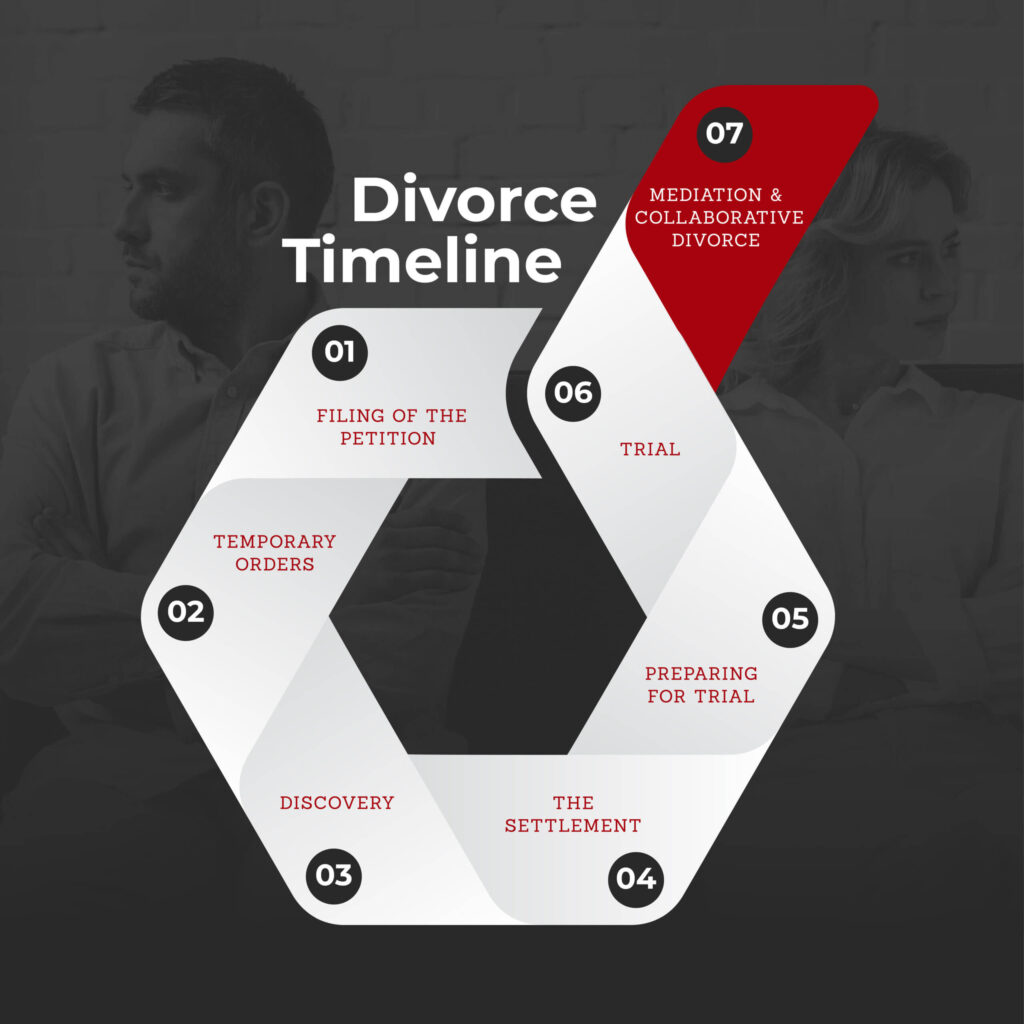In Massachusetts, the divorce timeline varies considerably from case to case. Multiple factors affect how long yours will take, as well as the challenges you’ll face along the way.
Divorce is never emotionally, financially, or logistically simple. One of the most common questions people ask when they start the process is: How long is this going to take? The answer depends on many things, including whether your divorce is contested or uncontested, how quickly you and your spouse can exchange required documents, and the current backlog in your local court.
In this guide, you’ll learn how the Massachusetts divorce timeline works from start to finish. We’ll walk you through uncontested and contested divorces, court scheduling patterns, the role of financial disclosures, and what you can do to keep things moving.
If you need more guidance, we invite you to explore our family law hub for helpful resources or to connect with one of our experienced attorneys.
What Is the Timeline for an Uncontested Divorce in Massachusetts?
The timeline for an uncontested divorce in Massachusetts is roughly six months, although that can vary depending on different factors.
An uncontested divorce (also known as a 1A divorce) is the fastest and most straightforward path. This type of divorce applies when both spouses fully agree on every issue: child custody, child support, alimony, property division, and all other terms.
Here’s what the timeline usually looks like:
- Joint Filing: Both spouses file a Joint Petition for Divorce along with a signed and notarized Separation Agreement. This signals to the court that all matters have been resolved privately.
- Court Hearing: The Probate and Family Court typically schedules a hearing within 4 to 8 weeks of filing. This hearing is brief—the judge ensures the agreement is fair and reasonable.
- Judgment Nisi: If the agreement is approved, the judge issues a Judgment Nisi that day. This is a provisional judgment that does not immediately dissolve the marriage.
- Judgment Absolute: After a mandatory 120-day waiting period, the divorce becomes final as a Judgment Absolute. No further action is required unless one party files a motion to reopen the case.
Total Timeline: Most uncontested divorces in Massachusetts take about 5 to 6 months from initial filing to final judgment. You can learn more about this process here..

How Long Does a Contested Divorce Take?
A contested divorce can take 18 months or even longer, depending on your specific situation.
Contested divorces (filed under Section 1B of M.G.L. c. 208) are significantly more complex and time-consuming. These cases involve unresolved issues such as:
- Child custody or parenting time
- Division of marital property or debt
- Alimony or child support
Typical Process:
- Complaint Filed: One spouse (the plaintiff) files a Complaint for Divorce. The court clerk issues a summons.
- Service of Process: The complaint must be served on the other spouse (the defendant), who then has 20 days to respond.
- Discovery: Both parties exchange financial documents under Rule 401 and Rule 410, including income, assets, debts, and expenses. Discovery may also include interrogatories, subpoenas, and depositions.
- Temporary Orders: Either party can request orders related to custody, support, or property while the divorce is pending.
- Pretrial Hearing: The court schedules a hearing to narrow disputed issues and push toward settlement.
- Trial: If no settlement is reached, a trial is held. The judge will decide all unresolved issues.
- Judgment Nisi: After trial, the court issues a Judgment Nisi. This becomes final 90 days later.
Total Timeline: Contested divorces in Massachusetts generally take 12 to 18 months, depending on complexity, cooperation between spouses, and local court backlog.
In Worcester Probate and Family Court, heavy caseloads can stretch this timeline even further.For a detailed overview of what to expect at trial, read our contested divorce trial guide.

What Are the Key Phases That Affect the Timeline?
The key phases that affect your divorce’s timeline include filing and process service, discovery, the issuance of temporary orders, pretrial hearings, the trial itself, and the post-trial nisi period.
Even the most organized divorce can run into snags. Here’s a breakdown of each phase that affects your overall timeline:
Filing and Service of Process
- The plaintiff must complete the Complaint for Divorce, filing it with the correct filing fee.
- Service must be completed within 90 days. If the defendant avoids service, the process may require alternative methods and extra time.
Discovery Phase
- Under Rule 401 and Rule 410, both spouses must disclose income, assets, and liabilities.
- Additional discovery methods include document requests, interrogatories, subpoenas, and expert appraisals.
- Delays often occur when one party is slow to respond or fails to provide complete information.
Temporary Orders
- Hearings may be held to determine parenting plans, support, or restraining orders before trial.
- These can extend the process if multiple motions are filed or challenged.
Pretrial Hearings
- Courts use these to narrow disputed issues, review exhibits, and encourage settlement.
- In Worcester, probation officers sometimes assist with mediating disputes, especially around parenting plans.
Trial
- May last 1 to 3 days for typical cases, but complex divorces can span several sessions over weeks or months.
- Trial scheduling is subject to court availability and is often delayed by continuances.
Post-Trial Nisi Period
- Once a ruling is made, a Judgment Nisi is entered.
- The marriage becomes legally dissolved 90 days later unless an appeal is filed or additional motions are submitted.
Why Do Some Divorces Get Delayed?
Divorces get delayed if one spouse cannot be located for service, due to financial disclosure issues, custody and parenting plan arguments, missed deadlines, and more.
While some delays are unavoidable, many can be prevented with preparation and cooperation. Common causes of delay include:
- Difficulty Serving the Other Spouse: If the defendant is hard to locate or avoids service, expect delays early in the case.
- Financial Disclosure Issues: Missing or incomplete Rule 401/410 documents can stall negotiations and court approval.
- Disputes Over Parenting Plans: Custody disagreements often require a Parenting Plan and may trigger Guardian ad Litem investigations.
- Missed Deadlines or Continuances: Courts may reschedule hearings if documents are late or if attorneys are unavailable.
- Judicial Backlog: In counties like Worcester, high case volume can push hearings and trials out by months.
Is There a Required Waiting Period or Separation Requirement?
Yes, there is a required waiting period after the judgment is given.
Massachusetts law does not require a specific period of separation before you can file for divorce. However, both contested and uncontested divorces have statutory waiting periods after the judge issues the Judgment Nisi:
- Uncontested (1A) Divorce: Finalized 120 days after Judgment Nisi
- Contested (1B) Divorce: Finalized 90 days after Judgment Nisi
This delay is important because it gives you and your spouse time to reconsider (and possibly reconcile), as well as providing time for adjustments, or appeals, depending on the situation.
Can You Speed Up the Divorce Process?
Yes, you can speed up the divorce process.
While you can’t eliminate every delay, there are several ways to keep things moving efficiently:
- File Early and Accurately: Submit all the required documents, particularly financial disclosures. It’s also important to make sure that all your information is accurate, or it may cause delays or even trigger investigations.
- Negotiate in Good Faith: Work together on issues like child custody and asset division so you can avoid going to trial.
- Use Mediation: A mediator can help you and your spouse find workarounds to many issues without going to court.
- Avoid Missed Deadlines: Submit documents on time and make sure you’re at all scheduled court appearances.
- Choose the Right Divorce Track: If possible, file a 1A Joint Petition for a faster resolution.
Do You Need a Lawyer to Stay on Track?
Yes, hiring an experienced divorce attorney is highly recommended to help keep your divorce moving forward.
While you can technically handle your own divorce (pro se), the process is full of deadlines, procedural rules, and legal risks. Mistakes can delay your case, lead to challenges, or even end in an outcome that favors your spouse.
A divorce attorney helps:
- Draft a legally sound Separation Agreement
- Manage financial disclosures and discovery
- Negotiate parenting plans and property division
- Advocate in pretrial hearings or at trial if necessary
Legal guidance helps to make sure that you don’t overlook key steps or get stuck in procedural limbo. Learn more about our attorneys here.
If you’re not sure how to proceed or want to avoid common pitfalls in divorce, we invite you to visit our family law hub for more insights. You can also explore our guides on parenting plans, financial disclosures, contested trials, and common divorce mistakes.
Understanding the divorce timeline in Massachusetts can help you prepare, avoid frustration, and make informed decisions every step of the way.

Michelle Murray has devoted her practice exclusively to family law matters, focusing her efforts on assisting clients through divorce, custody, property division, child support, spousal support, and visitation issues throughout Worcester County.
